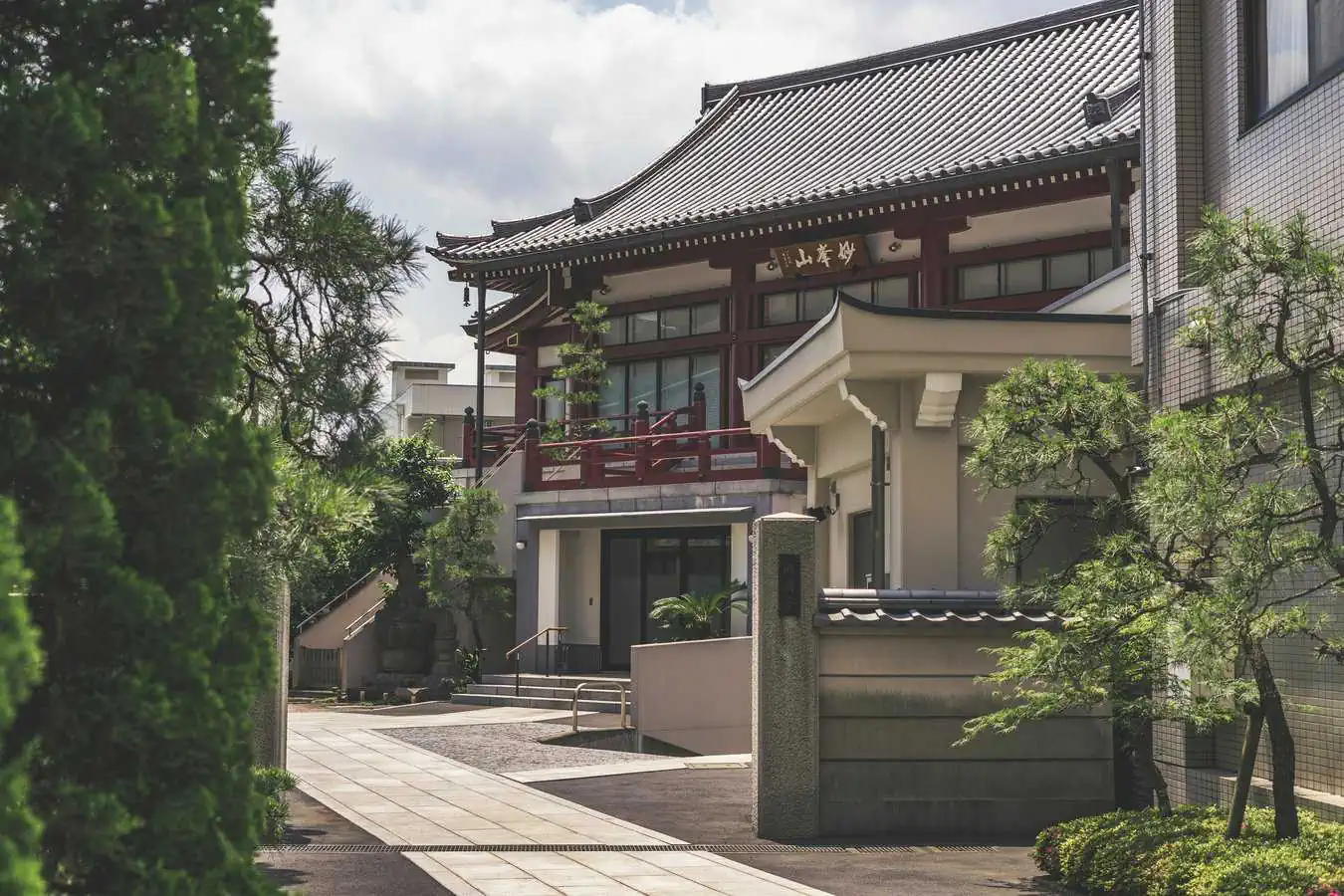Buddhism, a philosophy rooted in enlightenment and spiritual awakening, encompasses a multitude of intriguing customs and traditions. Among these, house names in Buddhism hold a unique and profound significance in the Buddhist culture. Let’s embark on a journey to unravel the mysteries behind house names in Buddhism, delving into their spiritual relevance and the rich tapestry of meanings they carry. List of house names in Buddhism is available below.
House Names in Buddhism: An Insightful Exploration
Buddhist house names, often referred to as ‘Viharaya,’ are more than mere labels; they embody the essence of spiritual beliefs. These house names in Buddhism are intricately connected to Buddhist teachings, reflecting the occupants’ devotion to their faith. Let’s explore the various facets that make these names an integral part of Buddhist households.

The Origin of House Names
Buddhist house names trace their roots back to ancient scriptures and teachings. Derived from sacred texts, these house names in Buddhism encapsulate the essence of Buddhist wisdom, peace, and enlightenment.
Significance in Daily Life
In Buddhist communities, house names are not arbitrary choices but carefully selected words that reflect the family’s aspirations, blessings, or gratitude towards the divine. They serve as constant reminders of the spiritual path and the pursuit of enlightenment.
The Ritual of Naming Houses
The process of naming a house in Buddhism is steeped in rituals and prayers. Monks or spiritual leaders are often consulted to select a house names in Buddhism that aligns with the occupants’ beliefs and resonates with the energy of the dwelling.
Symbolism Behind House Names
Each house name in Buddhism carries profound symbolism. From representations of virtues like compassion and wisdom to homage to revered figures in Buddhist history, these house names in Buddhism are laden with layers of meaning, enriching the spiritual atmosphere of the household.
Ideas on House Names in Buddhism
In Buddhism, especially in regions where Buddhism is prevalent, houses or residences often have names derived from the local language. These house names in Buddhism can carry deep meanings and significance. Please note that these names are a mix of Sanskrit and Pali, two ancient Indian languages closely associated with Buddhist traditions. The meanings provided are general interpretations, and the nuances might vary based on specific contexts and interpretations within different Buddhist communities.
Here are 50 house names in Buddhism for your beautiful abode
1. Vihara (विहार)
– Translation: Monastery or dwelling place.
– Meaning: Represents a peaceful abode for spiritual practice and meditation.
2. Bhavana (भवन)
– Translation: Place of cultivation.
– Meaning: Signifies a place where one nurtures spiritual growth and enlightenment.
3. Sangharama (सङ्घारम)
– Translation: Community garden.
– Meaning: Symbolizes a place where the community of monks resides and practices together.
4. Aranya (अरण्य)
– Translation: Forest or wilderness.
– Meaning: Represents a secluded, serene dwelling often situated in natural surroundings.
5. Grove (वन)
– Translation: Wooded area.
– Meaning: Denotes a peaceful sanctuary, often surrounded by trees and nature.
6. Upavana (उपवन)
– Translation: Miniature forest or garden.
– Meaning: Represents a smaller, peaceful garden-like residence for meditation and contemplation.
7. Dharmashala (धर्मशाला)
– Translation: Shelter for the Dharma.
– Meaning: Signifies a place where the teachings of Buddha are preserved and shared.
8. Karuna Kutir (करुणा कुटीर)
– Translation: Abode of compassion.
– Meaning: Represents a dwelling infused with compassion and empathy for all beings.
9. Sati Nilaya (सति निलय)
– Translation: Abode of mindfulness.
– Meaning: Symbolizes a residence where mindfulness and awareness are cultivated.
10. Ananda Vana (आनन्द वन)
– Translation: Grove of joy.
– Meaning: Represents a blissful and joyful dwelling where happiness and contentment prevail.
11. Metta Niketan (मेत्ता निकेतन)
– Translation: Abode of loving-kindness.
– Meaning: Represents a dwelling filled with boundless love, compassion, and goodwill.
12. Santosa Griha (संतोष गृह)
– Translation: House of contentment.
– Meaning: Signifies a place where inhabitants find satisfaction and peace in simplicity.
13. Kalyana Kutir (कल्याण कुटीर)
– Translation: Abode of auspiciousness.
– Meaning: Represents a dwelling where positive energies and spiritual blessings abound.
14. Karuna Griha (करुणा गृह)
– Translation: House of compassion.
– Meaning: Symbolizes a residence where inhabitants cultivate and practice compassion towards all living beings.
15. Amitya Vihara (अमित्य विहार)
– Translation: Monastery of boundless friendship.
– Meaning: Represents a place where friendship, harmony, and camaraderie flourish without boundaries.
16. Samadhi Griha (समाधि गृह)
– Translation: House of concentration.
– Meaning: Signifies a dwelling where inhabitants practice deep concentration and mental focus in their spiritual pursuits.
17. Prasada Vihara (प्रासाद विहार)
– Translation: Temple of grace.
– Meaning: Represents a sacred place where divine grace and blessings are received and shared.
18. Bodhi Bhavana (बोधि भवन)
– Translation: House of enlightenment.
– Meaning: Symbolizes a dwelling where inhabitants engage in practices that lead to spiritual awakening and enlightenment.
19. Anukampa Griha (अनुकम्पा गृह)
– Translation: House of compassion.
– Meaning: Represents a residence where inhabitants embody and practise deep compassion and empathy towards all beings.
20. Sukha Vana (सुख वन)
– Translation: Grove of happiness.
– Meaning: Signifies a peaceful dwelling where inhabitants experience and share happiness, joy, and contentment.
21. Dharmaduta Kutir (धर्मदूत कुटीर)
– Translation: Abode of Dharma messengers.
– Meaning: Represents a place where inhabitants are dedicated to spreading the teachings and principles of Dharma.
22. Ananda Griha (आनन्द गृह)
– Translation: House of bliss.
– Meaning: Symbolizes a dwelling filled with immense joy, contentment, and spiritual bliss.
23. Upeksha Vihara (उपेक्षा विहार)
– Translation: Monastery of equanimity.
– Meaning: Represents a place where inhabitants cultivate emotional balance, impartiality, and equanimity.

24. Karana Vana (करण वन)
– Translation: Grove of compassion.
– Meaning: Signifies a dwelling surrounded by an atmosphere of compassion and kindness.
25. Mudita Kutir (मुदिता कुटीर)
– Translation: Abode of sympathetic joy.
– Meaning: Represents a place where inhabitants celebrate the success and happiness of others with genuine joy and delight.
26. Viveka Griha (विवेक गृह)
– Translation: House of discernment.
– Meaning: Symbolizes a dwelling where inhabitants cultivate wisdom, discernment, and clear understanding.
27. Shanti Vihara (शान्ति विहार)
– Translation: Monastery of peace.
– Meaning: Represents a serene and tranquil abode where peace and harmony prevail.
28. Anicca Bhavana (अनिच्चा भवन)
– Translation: House of impermanence.
– Meaning: Signifies a dwelling where inhabitants reflect on the impermanent nature of existence, fostering detachment and acceptance.
29. Bhikkhu Griha (भिक्षु गृह)
– Translation: House of monks.
– Meaning: Represents a residence specifically for monks, dedicated to monastic life and spiritual practice.
30. Vimutti Vihara (विमुत्ति विहार)
– Translation: Monastery of liberation.
– Meaning: Symbolizes a dwelling where inhabitants aspire for spiritual liberation and freedom from the cycle of birth and death.
31. Anupubbani Vihara (अनुपुब्बनि विहार)
– Translation: Gradual progress monastery.
– Meaning: Represents a place where inhabitants follow a step-by-step path towards spiritual development and enlightenment.
32. Brahmavihara Kutir (ब्रह्मविहार कुटीर)
– Translation: Abode of divine abidings.
– Meaning: Signifies a dwelling where inhabitants cultivate the divine qualities of loving-kindness, compassion, empathetic joy, and equanimity.
33. Arogya Griha (आरोग्य गृह)
– Translation: House of health.
– Meaning: Represents a residence where physical and mental well-being are prioritised, supporting a healthy and balanced lifestyle.
34. Kshanti Vihara (क्षान्ति विहार)
– Translation: Monastery of patience.
– Meaning: Symbolizes a dwelling where inhabitants practise patience, tolerance, and endurance, even in the face of challenges and difficulties.
35. Vipassana Kutir (विपश्यना कुटीर)
– Translation: Abode of insight meditation.
– Meaning: Represents a place where inhabitants practise Vipassana meditation, cultivating deep insight and understanding of the nature of reality.
36. Saddha Vana (सद्धा वन)
– Translation: Grove of faith.
– Meaning: Signifies a dwelling where inhabitants nurture and strengthen their faith and confidence in the Buddhist teachings.

37. Bodhisattva Griha (बोधिसत्त् गृह)
– Translation: House of Bodhisattvas.
– Meaning: Represents a residence where inhabitants aspire to attain Buddhahood for the benefit of all sentient beings, following the path of a Bodhisattva.
38. Sila Bhavana (सील भवन)
– Translation: House of moral conduct.
– Meaning: Symbolizes a dwelling where inhabitants uphold and practise ethical and moral principles, fostering a virtuous way of life.
39. Upekkha Vihara (उपेक्षा विहार)
– Translation: Monastery of equanimity.
– Meaning: Represents a place where inhabitants cultivate equanimity, remaining balanced and composed in all situations.
40. Brahmacari Griha (ब्रह्मचारी गृह)
– Translation: House of celibacy.
– Meaning: Signifies a residence where inhabitants observe celibacy and abstain from sensual pleasures, dedicating themselves wholly to spiritual pursuits.
41. Nibbana Kutir (निब्बान कुटीर)
– Translation: Abode of liberation.
– Meaning: Represents a dwelling where inhabitants strive for Nibbana (Nirvana), the ultimate state of liberation and enlightenment in Buddhism.
42. Panya Vihara (पञ्ञा विहार)
– Translation: Monastery of wisdom.
– Meaning: Symbolizes a place where inhabitants cultivate wisdom, knowledge, and understanding, transcending ignorance and delusion.
43. Virya Griha (वीर्य गृह)
– Translation: House of diligence.
– Meaning: Represents a dwelling where inhabitants practise diligence, perseverance, and effort in their spiritual endeavours.
44. Karma Vana (कर्म वन)
– Translation: Grove of deeds.
– Meaning: Signifies a peaceful dwelling where inhabitants engage in positive and virtuous actions, cultivating good karma.
45. Upasaka Griha (उपासक गृह)
– Translation: House of lay practitioners.
– Meaning: Represents a residence for lay Buddhists who diligently follow the teachings of Buddhism while leading a household life.
46. Sila Vana (सील वन)
– Translation: Grove of morality.
– Meaning: Symbolizes a peaceful dwelling where inhabitants focus on moral conduct, integrity, and ethical living.
47. Karana Griha (करण गृह)
– Translation: House of altruism.
– Meaning: Represents a dwelling where inhabitants practise selflessness and altruistic actions, dedicating their lives to the welfare of others.
48. Upajjhaya Kutir (उपज्झाया कुटीर)
– Translation: Abode of spiritual mentor.
– Meaning: Signifies a place where inhabitants receive guidance and teachings from a spiritual mentor, deepening their understanding of the Dharma.
49. Mudita Griha (मुदिता गृह)
– Translation: House of sympathetic joy.
– Meaning: Represents a residence where inhabitants find joy and happiness in the success and well-being of others, cultivating a selfless sense of joy.
50. Bhavana Vana (भावना वन)
– Translation: Grove of meditation.
– Meaning: Symbolizes a peaceful dwelling where inhabitants dedicate their time to meditation, contemplation, and inner spiritual development.
These house names in Buddhism represent various aspects of Buddhist practice and philosophy, embodying the virtues and ideals that practitioners aspire to cultivate in their lives.
Conclusion
In the realm of Buddhism, house names stand as silent sentinels of spiritual harmony and enlightenment. They bridge the gap between the material and the spiritual, reminding us of the profound teachings embedded in the fabric of Buddhist culture. By understanding the significance behind these house names in Buddhism, we not only enrich our knowledge but also embark on a journey towards inner peace and enlightenment. Download pdf on house names in Buddhism below.
download pdf on house names in buddhism
FAQs: Understanding House Names in Buddhism
Q: What is the significance of choosing a House Names in Buddhism?
Choosing a house names in Buddhism is a deeply spiritual act. It signifies the family’s devotion to Buddhist principles and serves as a source of inspiration for mindful living.
Q: Can a Buddhist house name change over time?
Yes, in certain circumstances, a Buddhist house name can change. This might occur due to significant life events or spiritual transformations within the household.
Q: Are Buddhist house names specific to certain regions or sects?
While the core principles remain the same, the choice of house names in Buddhism can vary based on regional customs and specific Buddhist sects. Each sect might emphasize different aspects of Buddhist teachings.
Q: How can one find a suitable Buddhist house name?
Consulting with knowledgeable monks or Buddhist scholars can guide individuals in finding a suitable house names in Buddhism. It’s essential to consider the spiritual significance and personal resonance of the chosen name.
Q: Do Buddhist house names have an impact on the occupants’ lives?
Yes, Buddhist house names are believed to influence the energy and spiritual atmosphere of a home. They are thought to bring blessings, protection, and positive vibrations to the occupants.
Q: Can non-Buddhists adopt Buddhist house names for their homes?
While the spiritual depth might be better appreciated by followers of Buddhism, non-Buddhists can also adopt these names, appreciating the universal values of peace, compassion, and enlightenment they represent.
suggested buddhist home name
check this link…
https://housenvillas.com/house-names-in-buddhism-50-serene-names/
A bright collection of mindful names… Thank you
Thanku…